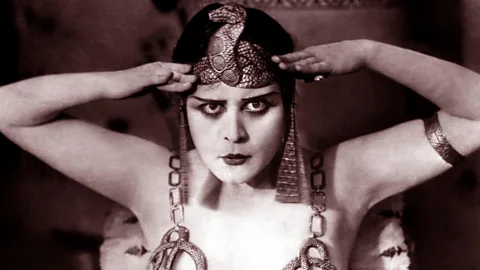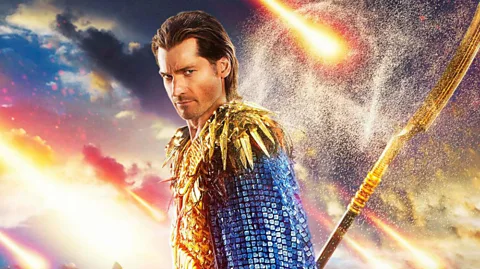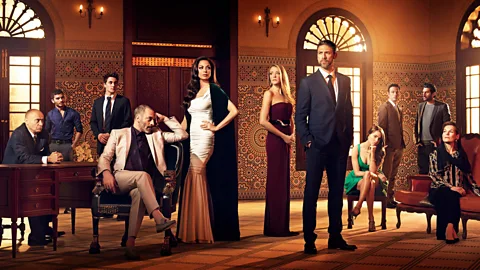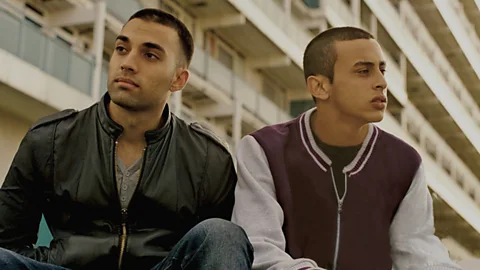‘Billionaires, bombers and belly dancers’
 World History Archive/Alamy Stock Photo
World History Archive/Alamy Stock PhotoA new film has prompted controversy, with white actors playing Egyptian characters. Arwa Haider looks at how Arabs have been portrayed on screen.
The new fantasy epic Gods Of Egypt features an almost exclusively white cast playing Egyptian characters. When its trailer was released, the public response prompted an apology from film studio Lionsgate and director Alex Proyas – yet it’s just the latest film to spark ‘race-bending’ controversy, in a month when the row over diversity at the Oscars continues to grab headlines. While the omission of black actors and film-makers at the Academy Awards does seem incredibly skewed, other ‘minorities’ also remain side-lined in the showbiz spotlight.
With the Middle East dominating world news, there has appeared to be a modern trend for Arab themes in Western entertainment, whether it’s big-screen blockbusters such as American Sniper (nominated for several Oscars in 2015), or glossy US TV series such as the Arab dynasty of Tyrant (from the makers of Homeland, and set for a third season in 2016). In fact, that trend is a well-worn obsession; Arabs have been feared and fetishised in Western film and TV since the early days of Hollywood. Silent movie images still speak volumes, from the fatal attraction of screen vamp Theda Bara (whose name was an anagram of ‘Arab death’) to Rudolph Valentino embodying an orientalist fantasy in 1921’s The Sheikh.
 World History Archive/Alamy Stock Photo
World History Archive/Alamy Stock PhotoThe advent of ‘talkies’ sealed the stereotype. Jack Shaheen, author of Reel Bad Arabs: How Hollywood Vilifies A People, summed up a prevailing image in his 1984 book The TV Arab, of characters limited to “billionaires, bombers and belly dancers”. In 21st-Century film and TV, Arabs remain highly visible yet firmly excluded.
Lifting the veil
As an Iraqi-born girl growing up in 1980s and 1990s Britain, I was conscious of the bigotry that pervaded popular culture; I just wasn’t sure how to react to it. I looked for recognisable reflections onscreen, even in commercials (a slogan for Turkish Delight reassured me that I was “full of eastern promise”). I was a fan of box-office hits like Back To The Future (1985), yet perplexed to see Marty McFly and the Doc being terrorised by gun-toting ‘Libyans’ yelling indecipherable words, and played by white actors in ‘brownface’.
If Arab men in films and shows seemed unconvincing, the females were barely there at all – veiled and voiceless, a far cry from the strong women of my family background. So I identified with any ‘outsiders’ on screen, which back then encomed all non-Caucasian roles. Often even these weren’t what they appeared. In US actor/comedian Aziz Ansari’s 2015 piece in The New York Times, entitled Acting, Race and Hollywood, he recalls seeing an Indian lead character in a mainstream movie (scientist Benjamin Jahrvi in 1988’s Short Circuit 2) for the first time. As a young viewer like Ansari, I was charmed by this Indian hero – and later baffled to discover he was played by a white actor.
Getting into caricature
Meanwhile, the Arab caricatures continued: in the form of oil-rich and sex-crazed sheikhs, or inept terrorists, including the Indiana Jones adventures, Harem, The Jewel Of The Nile, True Lies and limp comedy Father Of The Bride 2. Arabs would be swarthy bullet-fodder in countless Hollywood war movies, notably with a scene in Rules Of Engagement (2000), where an Arab crowd including women and kids are gunned down by gung-ho US marines.
Nationalities would sometimes be name-checked – Palestinians and Libyans prevailed in the ‘80s, when the likes of Yasser Arafat and Gaddafi were political bogeymen; Iraqis emerged on screen after the first Gulf War, including in David O Russell’s well-intentioned ‘intelligent blockbuster’ Three Kings (1999) – but the diversity within Arabic cultures was often flattened out. Sometimes, Arab characters have been interchangeable with Iranians; no matter that they don’t speak the same language, these are expendably samey portrayals: barking, hook-nosed bad guys, uneasily close to anti-Jewish stereotypes.
Even today, it’s still hotly debated whether ‘authenticity’ really matters if ‘it’s only entertainment’. When Arabic graffiti artists snuck subversive messages such as “Homeland is racist” onto the TV show’s set in 2015, it felt like a smart riposte, yet some commenters claimed that 99% of the audience wouldn’t be able to understand Arabic anyway. Given that Homeland is broadcast internationally, and Arabic is one of the most spoken languages in the world (estimated at around 490 million speakers), it’s likely that a fair number of viewers are more clued-up than that, even when the programme-makers aren’t.
 PR
PRTyrant, meanwhile, unfolds in the fictionalised Middle-Eastern land of Abbudin, and its Arab lead characters are played by white performers, though actors with Arabic heritage do feature in its cast. These have included the Egyptian/Sudanese actor Waleed Elgadi, who says: “Tyrant was trying to sell the Middle East to middle America. You could argue that it whitewashes the Arab world – the fact that very few characters were played by actors of Arabic descent was bewildering – although at the same time, a variety of stories come out as the result of a successful show.”
Another British Arab actor who has featured in Tyrant (and is soon to appear in BBC drama The Night Manager) is 25-year-old Amir El-Masry, whose surname is a clue to his Egyptian roots. Starting out in youth theatre, El-Masry paid little attention to ‘unrecognisable’ images of Arabs onscreen. His big break came via a chance meeting with acting hero Omar Sharif (“He told me: ‘If you want to be respected by Westerners, start by working in Egypt’”); he won a leading role in the Egyptian movie Ramadan Mabrouk Abul-Alamein Hamouda (2008), leading to a prestigious industry award.
 PR
PR“I never saw myself as different until I started walking into casting sessions,” says El-Masry. More recently, he declined a role in a “Hollywood A-list” film; he was told the available part would be non-speaking, but he would feature throughout the drama – before blowing himself up at the end.
“I didn’t come into this business for a quick buck; I’m in it for the long haul,” says El-Masry. “What if a little kid in Egypt who knows my work sees that and thinks: ‘He’s left the Egyptian film industry to portray us in this light? We’re always going to be villainised’.”
Talk like an Egyptian
Elgadi agrees that roles are limited for Arab actors. He happened to begin his drama training a week after 9/11. “Back then, there was a knee-jerk reaction to what was going on in the world,” he recalls. “The look that I had was ‘in vogue’. To put it bluntly, I’ve played every kind of terrorist you could imagine. As well as Arab mystics: ‘the man with the desert in his eyes’!” While recording audio at one post-production session, fluent Arabic-speaker Elgadi was told that he didn’t sound Arabic enough. “The sound engineer asked me: ‘Could you make more khhh noises? Like you’re clearing your throat?’,” he laughs ruefully.
Surely the temptation exists to rail against these clichés? “As an aspiring young actor, you want to be out there, and you probably don’t want to be seen as a troublemaker,” says Elgadi. “Sometimes, you have to wrestle with your personal demons; you take roles on a case-by-case scenario.” Elgadi’s roles include the Saudi-set comedy drama film A Hologram For The King (based on Dave Eggers’ novel, and starring Tom Hanks), and ITV period drama Tutankhamen.
A drama school teacher originally advised Elgadi to anglicise his stage name to William Elgardi “to avoid stereotyping”; following an extended stay with family in Sudan a few years ago, he reverted to his birth name. He feels that he is increasingly working on his own , and that things are slowly changing: “It has something to do with the Arab world taking charge of the stories we’re presenting to the world,” he says. “Terrorism and police states and racism are rife in the Middle East, but the Arab world needs to talk about it, and present our own comments. We need to take ownership of writing our own material.”
There are sometimes surprisingly subtle turning-points. Intriguingly, one of the most positive images of a modern Arab-American family to date has been in cartoon form. The Simpsons’ 2008 episode MyPods And Boomsticks has Bart befriending a Jordanian boy called Bashir, and pokes fun at Homer’s fears that terrorists have infiltrated the neighbourhood. Acclaimed US sitcom Community features a half-Palestinian character, Abed (played by Danny Pudi). And recently, the Golden Globe-winning US drama Mr Robot is also notable for its lead actor, Rami Malek. “The fact that I am of Egyptian descent speaks of the changes that are hopefully happening in Hollywood these days,” says Malek.
Malek isn’t unique in his heritage; an older generation of US stars, from Jerry Seinfeld to Salma Hayek, have Arabic roots – they’re just not necessarily identified as such. And perhaps that has been reflected in Malek’s earlier roles; prior to starring as Elliot Alderson in Mr Robot, the youthful-looking 34-year-old played a Pharaoh (in Night At The Museum) and a suicide bomber (in 24). Bizarrely, veteran US actors who have downplayed Arab roots have actually donned ‘brownface’ and prosthetics to play up to stereotype roles – take Jamie Farr (born Jameel Farah) as the sheikh in the Cannonball Run movies.
Yet independent and arthouse films present an inspiring range of representations, including contemporary Arabic talent whose work has successfully crossed over to international audiences, such as Palestinian film-maker and actor Elia Suleiman (Divine Intervention; The Time That Remains) and Lebanese director/actress Nadine Labaki (Caramel; Where Do We Go Now?).
Between the lines
The greatest progress arguably comes when Arab characters are presented as dealing with immediately recognisable, close-to-home issues. A refreshing example came in the form of Welsh-Egyptian writer/director Sally El Hosaini’s debut feature film, My Brother The Devil (2013), which won numerous awards including at the Sundance Film Festival, the BFI London Film Festival and the Berlin Film Festival. Its protagonists, Mo and Rashid, are Londoners of Egyptian descent, whose coming-of-age issues involve gang culture, male identity and homophobia.
El Hosaini explains that she has been bored by shallow Arab caricatures. “One of my motivations in making My Brother The Devil was to present Arab characters as multi-dimensional people; complex and contradictory,” she says.
 Paladin/101 Media
Paladin/101 Media“I also didn’t want Mo and Rashid to be symbols for bigger concepts, as Arab characters often end up. They are just boys; London boys. They have an ambivalent relationship to Arab/Islamic culture that's both familiar and alien to them. Their concerns are the universal concerns of all British teenagers. They want to look good, make some money to buy the latest gear, and have sex. Yes, they struggle to survive the gangs, drugs and violence, but they have other needs, desires, and dreams as well. It's my personal frustration with the stereotypical portrayals of Arabs on screen that pushes me to seek even more honesty.”
El Hoseini is a powerful storyteller, though she is also pragmatic about the commercial end of the entertainment industry. “The indie scene doesn't tend to influence mainstream movie-making where only the dollar is king and whitewashing is sadly the norm. Many openly acknowledge that racism and sexism are rife... there’s certainly not enough colour-blind casting or diversity behind the camera,” she says. “The film and television industry need more people who are prepared to go beyond an intellectual understanding of what inclusivity is. People who are prepared to practise what they preach.”
That appetite for creative change, and greater representation, is fuelled from both sides of the cameras. It may be a gradual process, but even mainstream studios may eventually concede that by perpetuating lazy stereotypes, they’re alienating significant minorities among their viewers. El-Masry says he is “quietly positive” that more Arab lead characters will emerge in prime-time entertainment. “There are a lot of talented actors and film-makers coming up who happen to have Arabic heritage,” he says. “Everyone says that you have to play the game – but you have to believe that you have options, too.”
